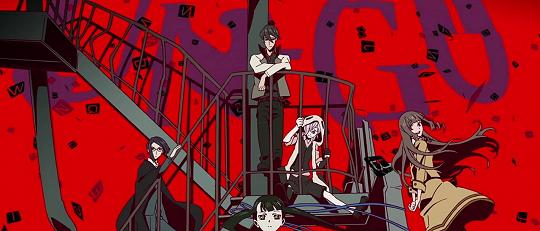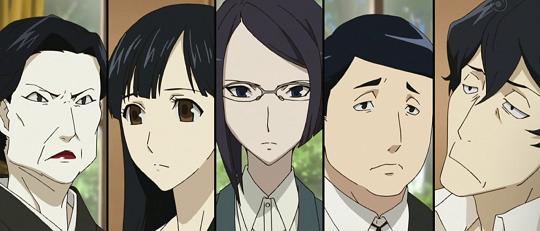The adage of "always leave the audience wanting more" is becoming increasingly apt for Studio Bones. Like with Bounen no Xam'd before it, Un-Go's creativity and, most of all, possibilities make the run-time almost criminally short. Especially when the concept - a detective revealing the truth of disparate then intertwined mysteries - has enough meat to last twice the petite eleven episodes.
This isn't to say it's rushed. The bite-sized opening mysteries are but a taster for the underlying one which stretches the entire latter half; unfortunately the format doesn't lend itself well to brevity. All too often the audience has to take events on faith and ride the story out rather than attempt to unravel the intrigue for themselves. Evidence is often scattered conspicuously around however the question of what the mystery is, often eludes just as much as the answer.
Starting with the most beloved of teasers, a locked-room murder, the characters are introduced uninspiringly. The smug puppet-master screams Light from Death Note and his preppy débutante daughter who is eager to establish her brand of naive curiosity don't bode well for likeable characters. Add on the animal suited "oh how cute!" Inga and the result is a cast that feels not so much formulaic as tiresome.
How pleasingly wrong this is.
The protagonist, the oddly named Defeated Detective, has the raison detre of revealing people's truths, but his less idealistic and more interesting foibles come out quickly. A fondness for a pretty face or his predilection for dwelling upon his mistakes doesn't make him human, but does make him interesting and is a trait that blossoms for the other characters. Even the walking talking Artificial Intelligence who seemed prime to take up the emotionless doll mantle.
She is but one of the more intriguing elements. Set in an alternate time-line where Japan has been victim to supremely near-apocalyptic domestic terrorism, the series ostensibly takes place in 2011 but with AIs, robots, flawless speech synthesis it deals with contemporary issues through a very old-fashioned character and plot.
Technology isn't the only modern element used: terrorism, war, privacy and anonymity are also explored. The often referred to Privacy Act bears uncomfortable similarities to currently proposed legislation (SOPA et. al.) as well as systems already in place such as China's great firewall. Prisons and prisoners take this draconian intrusion of individuality to new levels with a panopticon-style setup sporting inmates who are barcoded and constantly surveilled.
All this creates an atmosphere with hints of the post-WW2 feeling of powerlessness and xenophobic tensions but with mobile phones and pervasive internet access. It cries out for a less breathless exploration. Where the subtext and analogies - prisons as movie sets, the AI creator anonymising himself with a mask, a writer able to shape reality with his words - is given room to bed in and the audience is gifted time to process, digest and toy with the mysteries the detective currently just barrels through.
The greatest puzzle posed is one that perhaps has already been answered. Inga, the whimsical, shape-shifting micro-deity that clings to the detective Shinjuuro is never given a suitable context amongst the high-tech and high-class. The very last scene even teases with an in-world explanation muted by the brilliant closing track by LAMA. The presence of a cinema only double length episode 0 though, cunningly titled the "Inga Chapter", would clear this up and potentially highlight the characters present in the opening and ending but conspicuously absent from the series.
Un-Go isn't perfect. Its stride isn't hit until the half-way point and there are sigh-inducing moments from some of the female cast such as unnecessary stretching from the child-like AI Kazamori, a gratuitous batch scene from Rie or adult-Inga's revealing outfit. But beyond these superficial quirks is a cruft-less story, a wonderful cast and a multitude of thought provoking ideas that's over too quickly but stays stuck just long enough.



If I was being very picky I'd say the lack of dealing with the context of home-grown terrorism was disappointing but then it wouldn't fit with the rest of the show. It would be intriguing to see a Japanese point of view on it though considering they've never, historically or otherwise, had to deal with such an issue.
Regardless, thanks for reading and apologies for my belated response.